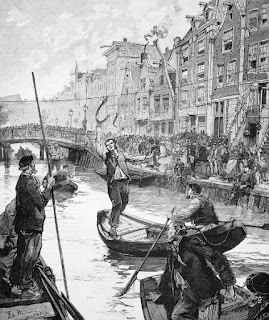Saturday, September 19, 2020
The Great Eel Riot
"In Amsterdam, the 'Eel Riot' (Palingoproes) occurred [in 1886], when the police tried to put down a revolting dock-district game in which eels were pulled to bits; it resulted in several dozen deaths and hundreds of casualties and arrests." (Norman Stone, Europe Transformed [Harvard UP, 1984], p. 46.) Stone attributes this and other contemporary uprisings to the stresses of the European economic depression in the 1880s. From our perspective in the modern United States, shortly after the "police riot summer" of 2020, we may instead consider why a riot over such minor causes turned so deadly (24 people killed). In the Dutch case, the cops opened fire on the rioters after the latter attacked a police station, and the most gravely wounded had no access to medical care before they died. A comparable incident last summer in Minneapolis, in which riotous protesters - with a far more serious cause than "give us back our eels" - actually set fire to a police station, resulted in no deaths (IIRC) and few to no injuries, because the cops were prudent enough to holster their guns and get out. Modern American police aren't saints, God knows, and too many of them have blood on their hands, but there is something to be said for their relative professional restraint. There is also something to be said for keeping police of all times and places away from lethal weapons.
Subscribe to:
Post Comments (Atom)


No comments:
Post a Comment